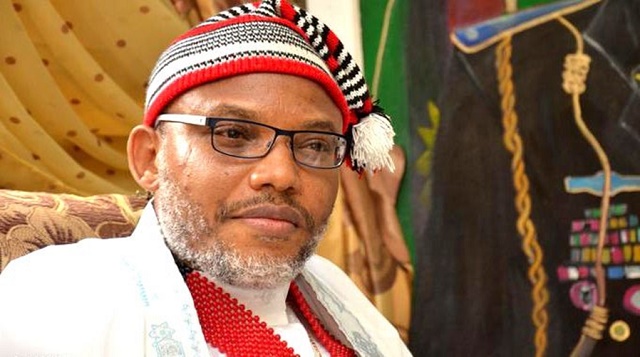Call him a mysterious person, you will not be wrong, for nothing can be more mysterious than a man who has held a whole nation to ransom and has remained at large.
Born Nwannekaenyi Nnamdi Okwu Kanu on September 25, 1967 in Isiama Afara in Abia State to Eze Israel Okwu Kanu (JP) and his mother, Ugoeze Nnenne Kanu, Nnamdi Kanu’s life has been dogged by activism.
Kanu had teamed up with Mazi Ralph Uwazuruike to form the Movement for the Survival of the Sovereign State of Biafra (MASSOB). The group has been campaigning for the creation of a state of Biafra.
Taking a cue from the secessionist movement led by Dim Odumegwu Ojukwu, which led to a civil war from 1967 to 1970, Kanu and Uwazuruike wanted to recreate that scenario and this time, they had opted for civil disobedience rather than armed combat.
However, Nnamdi Kanu, who also holds British citizenship, and Uwazuruike parted ways after Uwazuruike accused Kanu of mismanaging the propagandist Radio Biafra, which he (Uwazuruike) handed over to him.
However while Uwazuruike appeared to have relaxed his activism, Nnamdi carried on by forming the Indigenous Peoples of Biafra (IPOB) now proscribed by the federal government.
But Kanu was said to have changed his philosophy of non-violent agitation when in 2020 he formed the Eastern Security Network (ESN), a military arm of IPOB.
Kanu was said to have changed his philosophy as a result of alleged persecution by the Nigerian state. In 2017, a Federal High Court began his trial over treason charges.
Kanu was granted bail but fled, flouting his bail conditions. The Nigerian military invaded his country home in an operation called ‘Operation Egwu Eke’ or ‘Operation Python Dance’ during which they were said to have killed many IPOB members.
The first engagement of the military to the challenges posed by ESN was when the military tried to dislodge them from their camp in Orlu.
The military action led to a week-long military confrontation and Kanu had to ask the ESN to withdraw to the bush. Since then, the skirmishes between ESN and the soldiers have not ended.
The group, through its armed members, has been accused of being responsible for a series of killings, arson and abduction of innocent citizens in the South East region.
Using his Jewish religious inclination, Kanu has continued to draw many adherents from the region.
More puzzling is why the youth of the region owe much reverence to Kanu than to any leader in the region. Even such leaders are afraid to discuss Kanu to the extent that the mention of his name attracts some sort of apprehension.
The outcome of the recent sit-at-home order given by him to celebrate Biafra Day and those of others before it is an eloquent testimony to the grip he has on the region.
Attempts to speak with the man who started it all, Uwazuruike, were rebuffed. When our correspondent initially contacted him, he said he was in a meeting and would call later. When he was contacted the next day, he said he would not want to discuss anything about Nnamdi Kanu.
However, analysts have said that Kanu’s influence has continued to fester because of a lack of clear leadership in the region. They pointed out that Kanu is filling the yawning lacuna created by the leadership vacuum.
An energy expert and commentator on African Affairs, Barrister Anozie Awambu, said the Nigerian state made Nnamdi Kanu to acquire a larger than life image.
According to him, the present government made Nnamdi Kanu a worshipful figure by unwittingly detaining him concerning a cause on which modern Igbo socio-political identity stands – Biafra.
But an accomplished editor and publisher, Mr. Steve Nwosu, said no enlightened person can believe Kanu. He, however, said it’s the belief of the elite in Igboland that his nuances are needed to redress some of the imbalances in the system.
To Dr. Alex Oguamanam, a diaspora-based physician, the richness in Igbo society does not reach the grassroots.
One other worry is the group’s source of funds. The Minister of Information, Lai Mohammed, had declared that the sources of funds for IPOB had been traced to France and the United Kingdom. But Senior Special Assistant to the president on Diaspora Affairs, Abike Dabiri, was of the view that foreign sources of funds for the secessionist group were more than the two named by the government.
In the bid to trace the root of the organisation’s funding, a combined team of security agents invaded the home of IPOB lawyer Ifeanyi Ejiofor. His personal assistant, Samuel Uzo Okoro, also known as Biggy, was shot in the event.

 Join Daily Trust WhatsApp Community For Quick Access To News and Happenings Around You.
Join Daily Trust WhatsApp Community For Quick Access To News and Happenings Around You.


